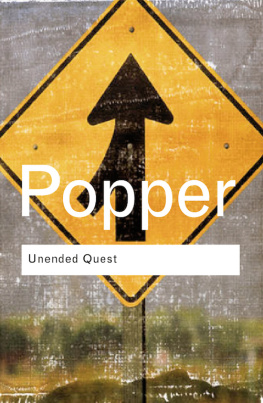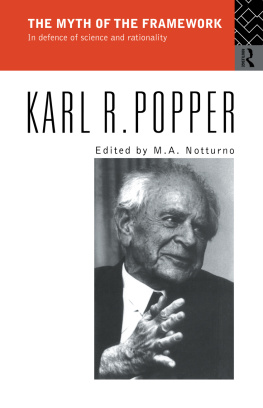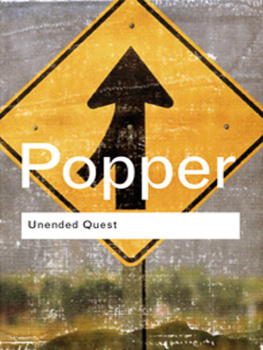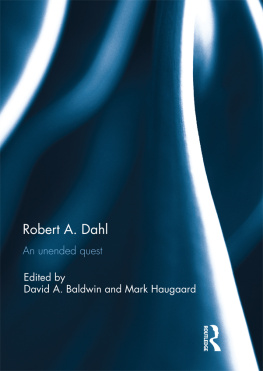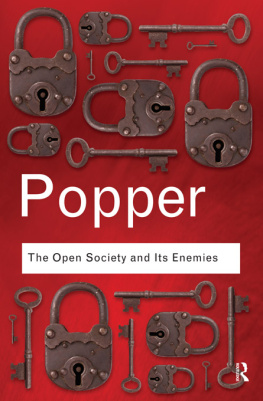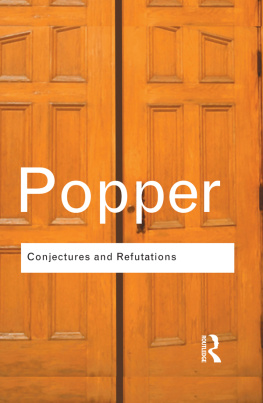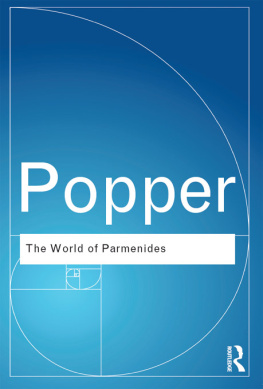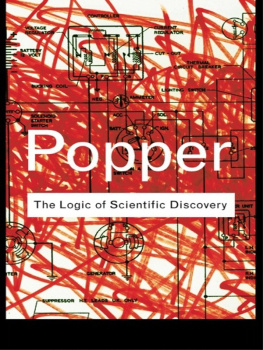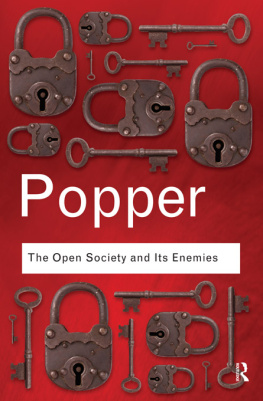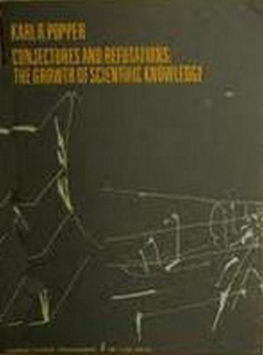Popper Karl - Unended Quest
Here you can read online Popper Karl - Unended Quest full text of the book (entire story) in english for free. Download pdf and epub, get meaning, cover and reviews about this ebook. year: 2002, publisher: Taylor and Francis, genre: Religion. Description of the work, (preface) as well as reviews are available. Best literature library LitArk.com created for fans of good reading and offers a wide selection of genres:
Romance novel
Science fiction
Adventure
Detective
Science
History
Home and family
Prose
Art
Politics
Computer
Non-fiction
Religion
Business
Children
Humor
Choose a favorite category and find really read worthwhile books. Enjoy immersion in the world of imagination, feel the emotions of the characters or learn something new for yourself, make an fascinating discovery.
- Book:Unended Quest
- Author:
- Publisher:Taylor and Francis
- Genre:
- Year:2002
- Rating:3 / 5
- Favourites:Add to favourites
- Your mark:
- 60
- 1
- 2
- 3
- 4
- 5
Unended Quest: summary, description and annotation
We offer to read an annotation, description, summary or preface (depends on what the author of the book "Unended Quest" wrote himself). If you haven't found the necessary information about the book — write in the comments, we will try to find it.
Unended Quest — read online for free the complete book (whole text) full work
Below is the text of the book, divided by pages. System saving the place of the last page read, allows you to conveniently read the book "Unended Quest" online for free, without having to search again every time where you left off. Put a bookmark, and you can go to the page where you finished reading at any time.
Font size:
Interval:
Bookmark:
This Autobiography was originally written to form a part of the two volume work The Philosophy of Karl Popper , edited by Paul Arthur Schilpp, and published as volumes 14/I and 14/II of The Library of Living Philosophers (La Salle, Illinois: The Open Court Publishing Company, 1974). Like all the contributions to this Library, the autobiography is due to the initiative of Professor Schilpp, the founder of the Library. I am most grateful to him for everything he did in this connection and for his infinite patience in waiting for my autobiography from 1963 to 1969.
I am deeply grateful to Ernst Gombrich, Bryan Magee, Arne Petersen, Jeremy Shearmur, Mrs Pamela Watts, and most of all to David Miller and to my wife, for their patience in reading and improving my manuscript.
Many problems arose in the course of the production of the original edition. It was only after the galley proofs had been corrected that, for technical reasons, the decision had to be made to collect the notes at the end of each contribution. (This is not unimportant because the manuscript was prepared on the understanding that the notes would be printed as footnotes on the bottom of the relevant pages.)
The work done during the production of the original volumes in The Library of Living Philosophers by Professor Eugene Freeman, Mrs Ann Freeman and by their editorial staff was immense, and I wish to thank them again at this place for their help and their care.
The text of the present edition has been revised. A few small additions have been made, and one passage has been removed from the text, and has been incorporated in note 20.
Penn, Buckinghamshire
May, 1975K.R.P.
I was asked by the publishers of this book to write a short postscript, and the question was raised whether I still think as I did when I originally wrote the book in 1969, and when I wrote (on page 144) that I am the happiest philosopher I ever met.
The question refers to my optimism, to my belief that we are living in a wonderful world. This belief of mine has only become stronger. I know very well that much is wrong in our Western society. But I still have no doubt that it is the best that ever existed. And much that is wrong is due to its ruling religion. I mean the ruling religious belief that the social world we live in is a kind of hell. This religion is spread by the intellectuals, especially by those in the teaching profession and in the news media. There is almost a competition of doom and gloom: the more radically one condemns our Western society, the greater seems to be ones chance to be listened to (and perhaps to play a leading role in it).
Hand in hand with this propaganda that our Western liberal democracies are doomed goes the belief, shared by many intellectuals, that Marxism is a science, and that we can know, thanks to the predictive power of science, that the Marxist creed will ultimately be victorious. And the inevitability of the victory of communism implies that the West ought simply to surrender rather than try vainly, of course! to resist the inexorable spread of communism by military force. So it is the West which would alone be responsible for any atomic war. In this way the West is seen as a terrible monster threatening the world, in a senseless attempt to prevent the advent of the communist heaven on earth.
The intellectuals are rightly progressive; but progress is not easy to achieve, and mere progressivism is dangerous since it may easily lead to mistaken decisions. By turning to Marxism as a progressive programme and finding it refuted, both in theory and in practice, the intellectuals have become even more radical. For they have found that they can retain their Marxist creed if they blame the resistance to Marxism by the capitalist (that is, the non-Marxist) states for the fact that Marxism has been so unsuccessful. (For example, many think that it is this resistance that has forced the Soviet Union to spend so much of its resources on armaments.)
The dream of a Marxist Utopia and Utopian radicalism and the hatred of the non-Marxist West has led to such things as the support of violence and to the assertion that the liberty which in the West is at present linked with industrialism, is a hidden form of totalitarianism, and therefore even worse than any open form of totalitarianism. This is the modern form of a political doctrine characteristic of the Western communists which I first encountered in 1919: the policy of the worse things are, the better (for the chances of communism).
It seems to me that there is only one thing we can learn from the Russians: they tell their people that they are living in the best society ever.
Anyone who is prepared to compare seriously our life in our Western liberal democracies with life in other societies will be forced to agree that we have in Europe and North America, in Australia and New Zealand the best and most equitable societies that have ever existed in the whole course of human history. Not only are there very few people who acutely suffer from lack of food or lack of housing, but there are infinitely more opportunities for the young people to choose their own future. There is a wealth of possibilities for those who wish to learn, and for those who wish to enjoy themselves in various ways. But perhaps the most important thing is that we are prepared to listen to informed criticism and are certainly happy if reasonable suggestions are made for the betterment of our society. For our society is not only open to reform, but it is anxious to reform itself.
In spite of all this, the propaganda for the myth that we live in an ugly world has succeeded.
Open your eyes and see how beautiful the world is, and how lucky we are who are alive!
May, 1986
My publisher has asked me to write a second Postscript for the new edition, since the first Postscript is now six years old. It seems to me that I may be living too long.
Indeed: my nearest relations have all died, and so have some of my best friends, and even some of my best pupils. However, I do not have a reason to complain. I am grateful and happy to be alive, and still to be able to continue with my work, if only just. My work seems to me more important than ever.
But I should not be speaking about myself: things of the greatest importance have happened during these past few years. The Soviet Union has collapsed and ceased to exist and, so far, without a major catastrophe. Together with the preparations for the First World War, which almost destroyed European civilization, this is the most momentous sequence of events in my life.
Soviet communism is over, and with it the greatest nuclear threat to mankind. So let us rejoice. And let us hope that the threat will not return in some new form: there are many possibilities. And let us disarm, and abandon the polarization of Left and Right part of the legacy of Marxism which was a consequence of the nuclear threat.
Let us now try to live in peace, and enjoy our responsibilities.
Kenley, February 1992
What to leave out and what to put in? Thats the problem.
Hugh Lofting, Doctor Dolittles Zoo .
When I was twenty I became apprenticed to an old master cabinetmaker in Vienna whose name was Adalbert Psch, and I worked with him from 1922 to 1924, not long after the First World War. He looked exactly like Georges Clemenceau, but he was a very mild and kind man. After I had gained his confidence he would often, when we were alone in his workshop, give me the benefit of his inexhaustible store of knowledge. Once he told me that he had worked for many years on various models of a perpetual motion machine, adding musingly: They say you cant make it; but once its been made theyll talk different! (Da sagn s dass ma so was net machn kann; aber wann amal eina eins gmacht hat, dann wern s schon anders redn!) A favourite practice of his was to ask me a historical question and to answer it himself when it turned out that I did not know the answer (although I, his pupil, was a University studenta fact of which he was very proud). And do you know, he would ask, who invented topboots? You dont? It was Wallenstein, the Duke of Friedland, during the Thirty Years War. After one or two even more difficult questions, posed by himself and triumphantly answered by himself, my master would say with modest pride: There, you can ask me whatever you like: I know everything . (Da knnen S mi fragn was Sie wolln: ich weiss alles .)
Font size:
Interval:
Bookmark:
Similar books «Unended Quest»
Look at similar books to Unended Quest. We have selected literature similar in name and meaning in the hope of providing readers with more options to find new, interesting, not yet read works.
Discussion, reviews of the book Unended Quest and just readers' own opinions. Leave your comments, write what you think about the work, its meaning or the main characters. Specify what exactly you liked and what you didn't like, and why you think so.

